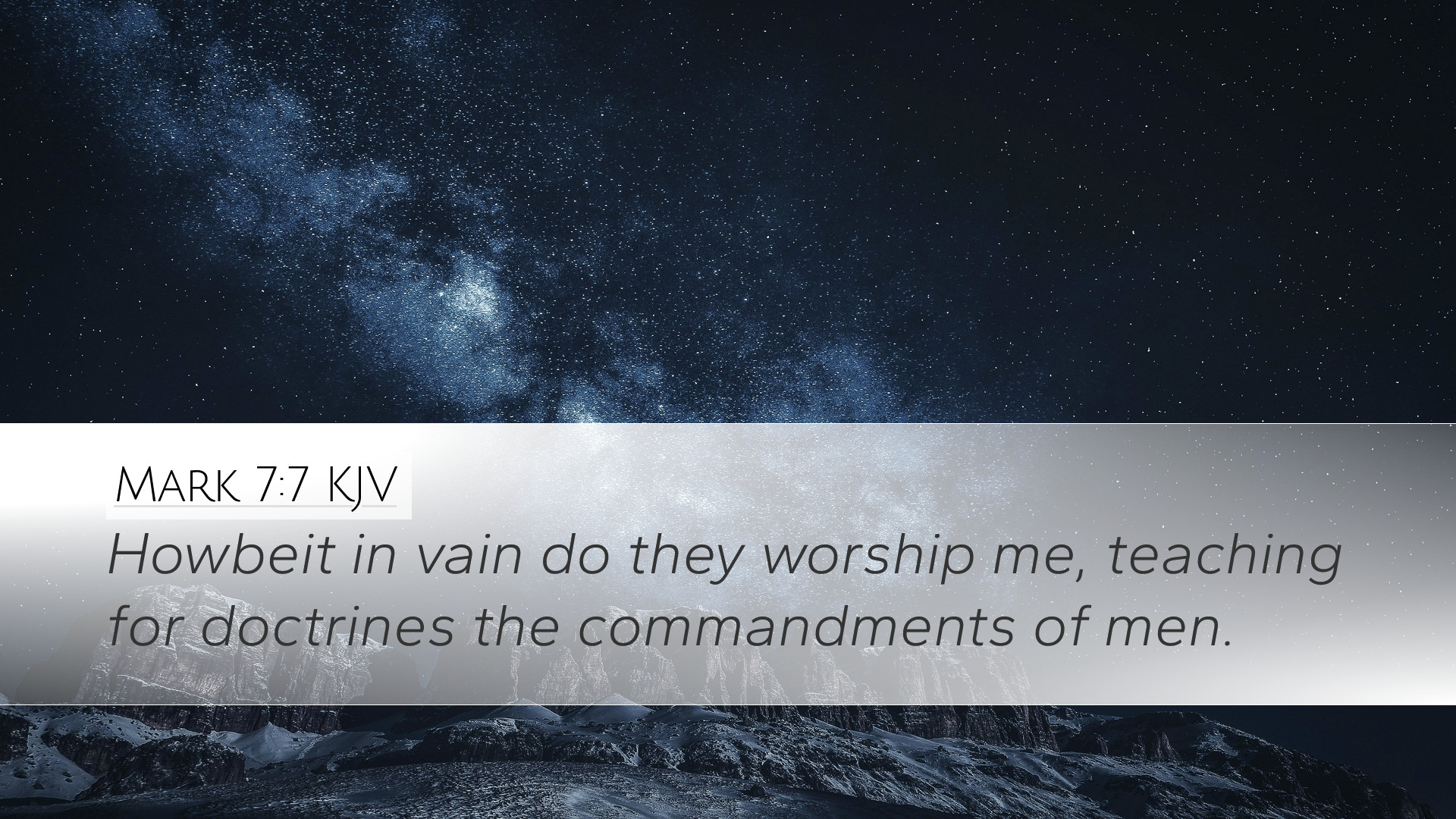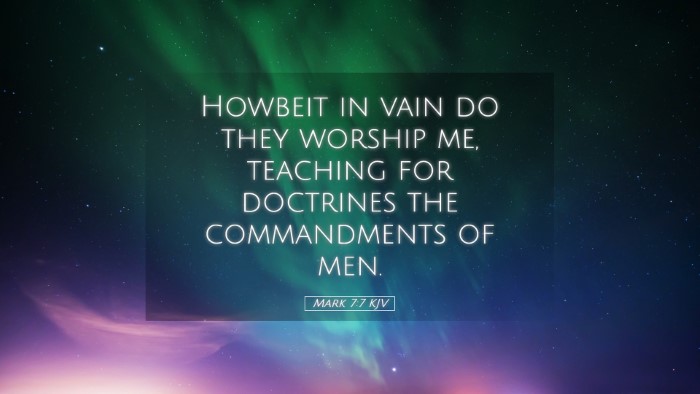Commentary on Mark 7:7
Mark 7:7 states: "In vain do they worship me, teaching for doctrines the commandments of men." This verse is a critical reflection on the nature of religious practice when it is divorced from true understanding and underlying principles of faith as revealed by God.
Contextual Background
The context of this verse is a confrontation between Jesus and the Pharisees regarding ceremonial handwashing. The Pharisees had established numerous traditions that were seen as equal to God's commands. Jesus's response highlights the dangers of elevating human traditions above the congregation's core principles of faith.
Insights from Matthew Henry
Matthew Henry emphasizes that this statement condemns the hollow worship that arises from human tradition. He insists that when men prioritize their doctrines over divine revelation, their worship becomes worthless. According to Henry, true worship must be informed by the Scriptures and not merely by social customs. He warns that reliance on human rules may lead one away from the pure intent of serving God.
- Worship's Essence: Henry describes worship that does not align with God's commandments as "in vain." He explores how true worship is grounded in understanding and obedience to God's laws, emphasizing the heart's sincerity over ritualistic practices.
- Human Tradition vs. Divine Command: He characterizes the teachings of the Pharisees as burdensome laws that divert the faithful from God's true intentions.
- Self-Righteousness: Henry notes that this tendency toward self-righteousness is a common pitfall for those who prioritize tradition over genuine faith.
Insights from Albert Barnes
Albert Barnes provides a thorough examination of the issue of worship being in vain. He posits that any form of worship not solidly rooted in the truth of God is utterly valueless. Barnes highlights several key points:
- Value of True Worship: Barnes argues that worship should be sincere and founded upon the truth as revealed in Scripture. He notes that without this foundation, worship becomes a mere performance rather than a genuine expression of faith.
- Hierarchy of Commands: He further elaborates that traditions can mislead believers, causing them to accept human authority over divine revelation. Jesus calls this out to redirect their focus back to God’s directives.
- Exclusive Authority of Scripture: Barnes is clear that true authority in spiritual matters rests solely with God’s Word and not with men. This aligns with the Reformation principle of Sola Scriptura.
Insights from Adam Clarke
Adam Clarke offers a vital contribution to our understanding of this discourse. He elaborates on the implications of worship that lacks divine legitimacy.
- Interpretation of "In Vain": Clarke emphasizes that to worship in vain denotes a severe indictment on the insincerity of the act, stripping it of all spiritual merit.
- Tradition’s Influence: He discusses how traditions often arise from noble intentions but can lead believers astray when allowed to eclipse the fundamental teachings of Scripture.
- Call to Authenticity: Clarke advocates a return to heartfelt worship characterized by authenticity and scriptural fidelity, encouraging believers to seek God personally rather than through the lens of human traditions.
Thematic Applications
This verse has profound implications for contemporary worship practices, urging a reevaluation of how traditions and doctrines influence worship. It encourages leaders and believers alike to consider the following:
- Authenticity in Worship: Are our worship practices truly reflective of our understanding of Scripture?
- Critical Evaluation of Traditions: It's essential to periodically assess traditions and ensure they enhance rather than detract from our relationship with God.
- Focus on Divine Authority: Aligning doctrines exclusively with Scripture fortifies the integrity of worship and teaching in the church.
Conclusion
Mark 7:7 serves as a timeless warning against the perils of misplaced authority and hollow worship. The insights from respected commentators like Matthew Henry, Albert Barnes, and Adam Clarke guide us in recognizing the valuable lessons in this verse that challenge both our individual and communal worship experiences. As we strive for a faith that honors God through true worship, let us remember the importance of adhering to His Word above human traditions.


